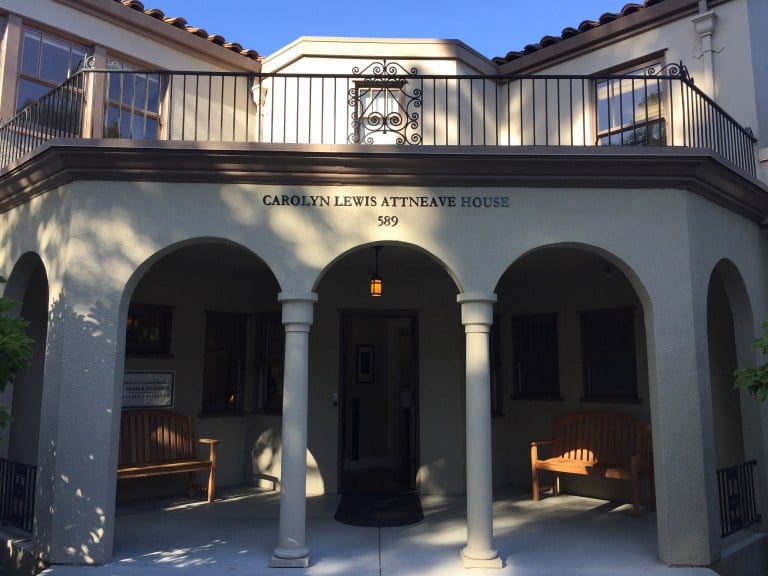Members of the Stanford community came together to commemorate the renaming of the Serra House, an academic building within the Clayman Institute for Gender Research, to honor Carolyn Lewis Attneave on Tuesday evening. The event celebrated the life and accomplishments of Attneave as well as the resilience and traditions of the Native American community at Stanford.
The event began with opening remarks by Vincent Medina and Louis Trevino, founders of mak-’amham, a restaurant and catering business seeking to reclaim lost heritage through reviving Ohlone Indian food traditions. Medina, who also serves as a councilman on the Muwekma Ohlone Tribal Council, cited the necessity of recognizing Native American resilience and efforts to “repair the wounds of colonization” through language revival and a celebration of food and culture previously suppressed. In particular, Medina advocated for the reassociation of Ohlone history with “victories, instead of the tragedies,” as he praised Attneave for tackling the historic trauma inflicted upon Native Americans with a clear vision and love for the community.
Medina’s words ring particularly true as the renaming follows over four years of efforts by the Stanford Native community, students, faculty and allies to replace campus landmarks which commemorate the legacy of Father Junipero Serra. The renaming of Serra dorm — now known as Sally Ride House — Jane Stanford Way and Attneave House followed consultation with the University Advisory Committee on Renaming Junipero Serra Features, in charge of evaluating Stanford building and site names, and providing recommendations which promote the University’s values of diversity and inclusion.
Attneave M.A. ’47 Ph.D. ’52 was a psychologist of mixed Lenni-Lenape and Scandinavian heritage who played a significant role in creating the field of Native American mental health. Internationally renowned for her groundbreaking work in cross-cultural heritage and psychology, Attneave was lauded for her inclusivity and respect for others.
Teresa LaFromboise, chair of the Native American studies department at Stanford, nominated Attneave for the honor. LaFramboise commented on Attneave’s remarkable collaboration with traditional healers, physicians and tribal and federal community members to advance gender equality and advocate for the inclusion of marginalized groups in the medical field. She founded the Society of Indian Psychologists and North American Indian Center of Boston.
The renaming held particular significance due to this alignment of the values of Attneave and the Clayman Institute for Gender Research, which is housed in Attneave House. Dedicated to advancing equality through gender research, the Institute engages students and faculty from across Stanford to tackle intersectional issues in gender equality with a focus on inclusion and empowerment.
Shelley J. Correll, director of the Clayman Institute, remarked that she felt “inspired by [the] parallel between what [Attneave] dedicated her life to and what our central mission is at the Clayman Institute.”
The Stanford community welcomed Philip Attneave and Dorothy Jackson, Carolyn Attneave’s son and daughter. Both spoke to their pride in Attneave’s accomplishments and sustained legacy.
In his address, Philip Attneave remarked that his mother “worked outside expected norms for culture and gender” and that she had a remarkable impact on her students and colleagues.
The celebration ended with a traditional Native American song by Adam Nalley ’21, and remarks by Stanford American Indian Organization President Carson Smith ’19. Smith praised the renaming for celebrating the legacy and continual presence of Native Americans at Stanford, while recognizing that this action is merely the first step to recognizing the forgotten narratives embedded in the history of California, and Stanford.
“Indigenous women are at the core of many communities,” Smith said. “To celebrate the life of Attneave … gives voice to the many diverse populations that did, do and will continue to exist at Stanford.”
Contact Brooke Beyer at bbeyer ‘at’ stanford.edu.
